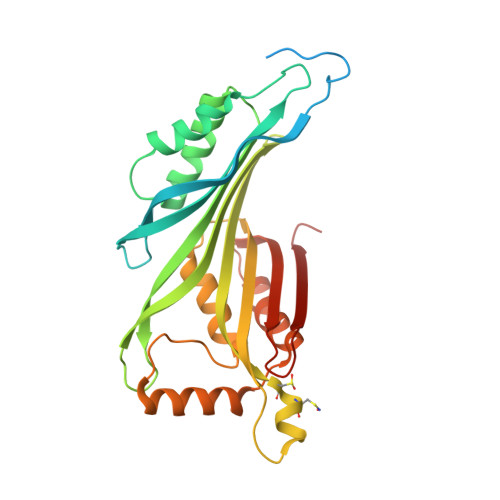Combatting melioidosis with chemical synthetic lethality.
Zhang, Y., McWhorter, K.L., Rosen, P.C., Klaus, J.R., Gallant, E., Amaya Lopez, C.Y., Jhunjhunwala, R., Chandler, J.R., Davis, K.M., Seyedsayamdost, M.R.(2024) Proc Natl Acad Sci U S A 121: e2406771121-e2406771121
- PubMed: 39495920
- DOI: https://doi.org/10.1073/pnas.2406771121
- Primary Citation of Related Structures:
8G6C, 8G8V, 8TCC - PubMed Abstract:
Burkholderia thailandensis has emerged as a nonpathogenic surrogate for Burkholderia pseudomallei , the causative agent of melioidosis, and an important Gram-negative model bacterium for studying the biosynthesis and regulation of secondary metabolism. We recently reported that subinhibitory concentrations of trimethoprim induce vast changes in both the primary and secondary metabolome of B. thailandensis . In the current work, we show that the folate biosynthetic enzyme FolE2 is permissive under standard growth conditions but essential for B. thailandensis in the presence of subinhibitory doses of trimethoprim. Reasoning that FolE2 may serve as an attractive drug target, we screened for and identified ten inhibitors, including dehydrocostus lactone (DHL), parthenolide, and β-lapachone, all of which are innocuous individually but form a chemical-synthetic lethal combination with subinhibitory doses of trimethoprim. We show that DHL is a mechanism-based inhibitor of FolE2 and capture the structure of the covalently inhibited enzyme using X-ray crystallography. In vitro, the combination of subinhibitory trimethoprim and DHL is more potent than Bactrim, the current standard of care against melioidosis. Moreover, unlike Bactrim, this combination does not affect the growth of most commensal and beneficial gut bacteria tested, thereby providing a degree of specificity against B. pseudomallei . Our work provides a path for identifying antimicrobial drug targets and for utilizing binary combinations of molecules that form a toxic cocktail based on metabolic idiosyncrasies of specific pathogens.
- Department of Molecular Biology, Princeton University, Princeton, NJ 08544.
Organizational Affiliation:























